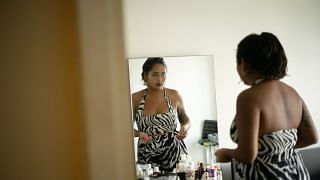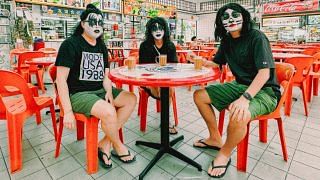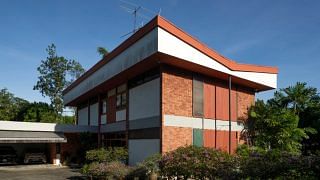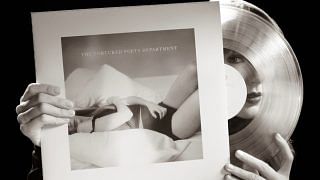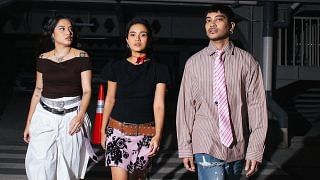While book sales have been on the rise globally due to the meteoric impact of teen literary influencers and their #BookTok recommendations on TikTok, our Lion City has also been seeing its own literary renaissance. With numerous bookstores launching physical spaces or pop-ups alongside online channels (or in some ambitious cases, both), reading has never been cooler – or more accessible.
While many of them share the underlying mission of championing Singaporean literature or reading as a whole, each platform has gone about it in its own unique way – be it by engaging communities with interactive pop-ups, publishing local titles, or simply offering a safe, laid-back space for readers to discover new titles in-person. Ahead, we put the focus on four players you need to know.
WORMHOLE

Wormhole prides itself as a haven for literary works by authors from marginalised communities who need more visibility
If you’re a bibliophile in Singapore, chances are that you would’ve stumbled across Wormhole on Instagram. Launched in October 2021 by Founders Seet Siew Ling and Charmaine He, Wormhole is an online bookstore dedicated to stocking diverse publications that you might be hard-pressed to find in mainstream stores – everything from queer poetry and graphic novels to local and feminist titles. Their intention, they explained, is to stock books with themes and perspectives that could use more visibility, or by authors from marginalised communities.
But another thing that stands out is Wormhole’s track record of unique physical pop-up events. While the founders only began by hosting book club events, they were soon invited to take part in larger initiatives. These included Ethos Books’ Dakota Dreams event at the Old Airport Road hawker centre, which sought to unite diverse perspectives across Singapore’s many communities, and the recent Singapore Night Festival 2023.
What prompted you to open?
Seet: “I’ve been an avid reader since I was a child, and worked in a couple of bookstores before. One of the things that has always stuck with me is the perception non-readers have of books and reading – it’s always seen as boring, serious, or highbrow and best left to the ‘smart people'”. These are things I hear from people around me, and I observe it in the body language and the things said by non-readers who accompany someone into a bookstore. I found it such a pity because books – or rather, the stories they contain – are [full of] wonder. Storytelling brings people together, so I thought it would be nice to have a bookstore that captured that spirit of making stories fun and accessible for everyone.”
Why do you think it’s necessary to have physical bookstores?
Seet: “I recently read an interview with the owner of (Islamic bookstore) Wardah Books, Ibrahim Tahir. He said that the purpose of a bookstore is not to sell books exactly, but to provide a space for people to take their time and be immersed and surrounded by ideas.
As much as I enjoy running Wormhole as an online business — and also, speaking as someone who has worked in physical bookstores before — I don’t think anything can ever truly replicate the experience of being in one. It’s not really the tactile elements of holding a book for me but the human interaction between staff and customers. This creates an exchange of genuine warmth that I witness a lot when book lovers physically gather in a space. That’s something we try our best to preserve, even as an online bookstore.”
“Storytelling brings people together, so I thought it would be nice to have a bookstore that captured that spirit of making stories fun and accessible for everyone.”
Seet Siew Ling, co-founder of Wormhole
Can you share some pop-up highlights?
Seet and He (they prefer to answer this question as a duo): “We were invited to booth at this year’s Singapore Night Festival. Because its theme was Port City 2.0, which referenced barter and trade markets of the past, our concept was to use stories as currency. Instead of paying money, we asked people to share either a personal anecdote or the plot of their favourite book. We were nervous about whether people would be willing to do this because it involved so much social interaction when most of the event-goers were there to shop, eat or look at the art and performances.

The selection of merch curated by Wormhole on its website
It was incredibly eye-opening to see that not only were people willing to share stories, but they were also willing to get personal. We had people talking about traumatic incidents, weird dates, therapy, friendship problems… you name it. And what really left an impression on us was that many of them started off by saying their story wasn’t going to be interesting, or they don’t really have any stories to tell – and then they went on to prove themselves wrong.
When we started Wormhole, we always said that beyond books, we believe in the power of stories, and that every single person – reader or non-reader – has stories to tell, and stories they want to hear. This was particularly memorable for us, because the event truly felt like a living embodiment of what Wormhole is about.”
What do you hope to accomplish?
Seet and He (they prefer to answer this question as a duo): “Someone once pointed out that we’ve managed to take something that feels almost antiquated and turn it into something fresh and innovative. I think that’s the perfect summary of what we hope to keep doing – we want to change people’s mindsets about bookstores as places reserved for intellectuals. As much as reading involves the mind, we believe there’s a lot of fun and heart too, and we want to use that to help establish the bookstore as a community space.”
BOOK BAR

Book Bar is the newest kid on the Duxton Hill block
As of July 2023, the breezy, trendy district of Duxton Hill is home to one of Singapore’s newest bookstores: Book Bar. Founders Alex Chua and Sara Ng opened it intending to foreground Singaporean and international Asian writers, while fostering a strong reading culture and appreciation of local literature. A cozy cafe also sits within the premises, where visitors are invited to enjoy their brew of choice alongside a good book and engage in conversations with each other.
Book Bar – situated on 57 Duxton Road – has certainly been busy since its inception, having hosted numerous events such as discussions led by activist Kirsten Han and the launch of Marc Nair’s poetry collection The Earth in our Bones. With time, Chua hopes that the store serves as “a place of community, a place that people will feel part of and enjoy coming to whenever they drop by.”
Between having to pay for rent in Singapore and competing with purely online book-selling businesses, owning a bookstore is no easy feat. What prompted you to open?
Chua and Ng (they prefer to answer this question as a duo): “We felt that there was a space to be filled after the closure of several prominent independent bookstores and that for book lovers, nothing beats actually physically browsing books, as compared to [doing so] online. Having face-to-face conversations with people helps to recommend a book that we think they would enjoy.”
How did you decide on your location?
Chua and Ng (they prefer to answer this question as a duo): “We wanted to be in an area that is both central for Singaporeans and a tourist destination. The Duxton area fits the criteria perfectly, with its main draw being the modern, edgy concepts housed in heritage conservation shophouses. It is quite literally a blend of the old and new, in a quintessentially Singaporean way.”
Why do you think it’s necessary to have physical bookstores?
Chua and Ng (they prefer to answer this question as a duo): “There’s a certain charm in wandering in bookshops and finding books and discovering authors you would not have known about if you looked online. Physical bookshops are also spaces for holding book launches and talks, [serving as] a place for authors to meet their readers.”
“There’s a certain charm in wandering in bookshops and finding books and discovering authors you would not have known about if you looked online.”
Alex Chua and Sara Ng, co-founders of Book Bar
How did you decide on stocking Singaporean and international Asian names?
Chua and Ng (they prefer to answer this question as a duo): “Primarily, we wanted to showcase Singaporean literature because Singaporeans themselves do not realise how much local literary talent there is. There has also been a global diversity movement in recent years, and the literary works of the Asian diaspora has been of particular interest around the world. Promoting the works of Asian authors will allow Singaporeans to better understand the experiences of Asians all over the world.”
A MILLION BOOKS

Books get a new lease of life at A Million Books
With sustainable initiatives growing in popularity across Singapore, A Million Books is paving the way for how readers can do their part to develop more environmentally friendly book-buying habits. A Million Books is the book-centric arm of The Sustainability Project, a platform established by Jolene Tang to encourage a low- to zero-waste lifestyle. After A Million Books opened in October 2020, volunteer Chong Yun Yu soon joined Tang after expressing her interest in helping out with the initiative over Instagram. Today, the platform collects and sells pre-loved books, and then donates the funds to the National Parks Board’s One Million Tree movement (which, as you could’ve guessed, hopes to plant a million trees by 2030).
Since its inception, the platform has re-homed over a thousand books and planted five trees (and counting!) in three years – an impressive feat considering it’s run by a lean team of volunteers. Visitors can drop by its volunteer-run in Bukit Batok Crescent (#06-78 WCEGA Tower), but be sure to schedule an appointment prior.
“Jo originally loved to read and has a habit of hoarding many books and shopping pre-loved. As we were experiencing Covid-19 in 2020 and with a lot more people staying at home, the habit of reading started to grow again,” Chong tells us. “So we decided to take the chance to encourage others to read pre-loved books like she usually does and also find a way to give back and close the loop, by planting trees!
How did you guys get involved with A Million Books and The Sustainability Project?
Chong: “Jo was looking for like-minded people to help with the pre-loved books initiative. YY was the first to reach out to Jo to express her interest. Fun fact – it was via an Instagram story reply. I decided to get involved because she wanted to contribute meaningfully towards the environment. I had experience being a librarian and managing social media accounts, so [volunteering] came quite naturally to me.”
You have a physical bookstore in Bukit Batok Crescent, which is open by appointment-only. How did you decide on this location?
Chong and Tang (they prefer to answer this question as a duo): “Frankly speaking, we needed a space to keep the books. We started off with less than 50 books from Jo’s personal collection, and with more and more community donations, we once peaked at about 1,000 books. Although now we are stabilising at around 650, that is still a lot of books. Jo had a showroom for The Sustainability Project, one of the first few brands in Singapore launched with the aim to push for sustainability. We put up three shelves in that space, and opened it up for anyone who liked to browse the books in-person.”

A Million Books is situated in an industrial building in Bukit Batok
As a volunteer-run space, what are the challenges of running A Million Books?
Chong and Tang (they prefer to answer this question as a duo): “As a centralised space to interact with our community, all donations are brought to the store, either by the community themselves or by volunteers. We also use the same space for events, such as book sales. We are thankful that our donors are willing to send the books to the warehouse and we don’t have to transport the books ourselves. Selling books is quite hard because we don’t have new drops that frequently – it usually depends on how lucky we get with our donations! Also, sometimes it is hard for us to spend a lot of time and effort on the initiatives due to other commitments. But just like a plant, this initiative needs patience, time and paced-out growth.
The cost of running the initiative is quite tricky. Thankfully, we don’t have to pay exorbitant prices on rent to store our books as they are placed in the same premises as The Sustainability Project. Jo does not really ‘charge’ A Million Books for using the space, but a cost is still a cost, and Jo operates it at her own expense.”
What do you hope to accomplish?
Chong and Tang (they prefer to answer this question as a duo): “If we’re being ambitious, we hope to re-home 1 million books. But realistically speaking, three years into A Million Books, we re-homed around 1,000 books. This brings us to achieving a whopping 0.1 per cent of our goal – just 2997 more years to go! At the end of the day, it’s more about inspiring the community to take small actions towards a more environmentally sustainable lifestyle. There are many things that can still be done towards a better planet. We hope to educate, inspire action, and do good.”
How might those interested in volunteering with A Million Books get in touch?
Chong and Tang (they prefer to answer this question as a duo): “You can follow us on Instagram! We do occasional shoutouts on TSP Treehugging channel on Telegram.”
EPIGRAM BOOKS

Epigram has found its home in the Singapore Art Museum outpost in Tanjong Distripark
In 2011, Edmund Wee founded Epigram Books with the conviction to champion local literature and writers. And boy, has Wee come a long way since. Having published celebrated, seminal titles (such as Amanda Lee Koe’s Ministry of Moral Panic) and hosted its own Epigram Books Fiction Prize to promote creative writing in Singapore and Southeast Asia, it’s a no understatement to say that the publisher has moulded our literary scene for the better.
Some might recall its first outlet in Urban Redevelopment Authority (URA) Centre, which was set up in 2019 together with local coffee chain Huggs Collective. However, since last March, Epigram stands as a bookshop integrated into Singapore Art Museum (SAM)’s premises over in Tanjong Pagar Distripark. Not only was this a result of the institution approaching the publisher with an offer to use the space, but it also was a strategic choice seeing that “50 per cent of book buyers still buy from physical bookstores.”
While Epigram also has an online shop, we highly recommend visiting the impressive space. We guarantee that you’ll be mesmerised by the titles lining the breathtaking floor-to-ceiling shelves, which feature everything from volumes on Singapore and Southeast Asia to books written by local and regional authors.
What prompted you to open (both your physical stores in URA Centre and SAM)?
“Epigram Books started book publishing in 2011 and after eight years, we found that despite some runaway successes like The Art of Charlie Chan Hock Chye, the Diary of Amos Lee and the Sherlock Sam series, it was still difficult to get local books displayed prominently in the bookstore chains and independent shops. So when I came across an empty space in the URA Centre in 2019, I decided it was time to open a Singaporean bookshop. On March 1 2022, we moved from URA Centre to SAM because our lease ended and the museum approached us with an offer of their space.

Besides literary works, Epigram Book also stocks graphic novels, art books and objects such as this poster featuring the cover art of the acclaimed comic-book The Art of Charlie Chan Hock Chye by Sonny Liew
Have you noticed any trends amongst book publishers and readers alike?
“Since we started publishing in 2011 and retailing in 2019, there is less reluctance to avoid local books, [meaning that the] acceptance of SingLit is up.”
What books do you specialise in selling?
“When we went into retail in 2019, we were the first Singaporean bookstore; we sold only titles written or published by Singaporeans, or about Singapore. Since then, we have expanded the collection to include titles on Southeast Asia or written by Southeast Asians.”
“Since we started publishing in 2011 and retailing in 2019, there is less reluctance to avoid local books.”
Edmund Wee, founder of Epigram
How did you decide on this genre?
“We do not restrict our collection to a specific genre. So long as the subject matter is Singaporean (and to some extent Southeast Asian), we will stock the book. The collection ranges from picture books to early readers to middle grade titles for children. For grown-ups, we stock graphic novels, fiction, non-fiction, cookbooks and art books.”
How do you see yourself in the context of Singapore’s larger literary scene?
“Retailing is as important as publishing and writing. There’s not much point in giving grants to authors and publishers if their final products, the book, cannot find their audience. The bookshop (physical and online) completes the scene.”













